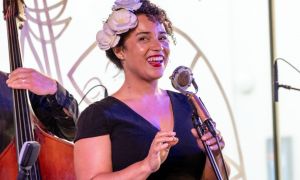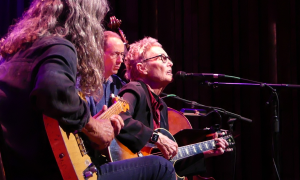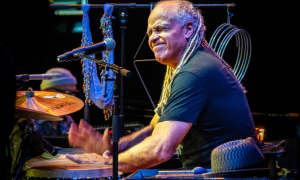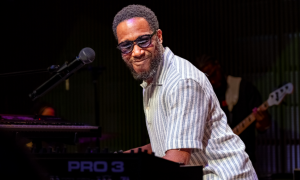Home » Jazz Articles » Live Review » JazzFest Berlin 2024
JazzFest Berlin 2024

Haus Der Berliner Festspiele
Berlin, Germany
October 31-November 3, 2024
Intro
For its sixtieth edition, the renowned JazzFest Berlin not only presented a full program of 24 shows by over 120 performers from around the globe, but also ran a research lab looking back at the event's history, and organized a series of participatory community events in the nearby district of Moabit. Not that it in any way needed to gild the lily as the music was typically superb. As is also now customary for what is probably Europe's premier jazz festival, most of the shows took place in the comfort of the Haus Der Berliner Festspiele, with other concerts taking place in nearby clubs and the iconic Kaiser Wilhelm Memorial Church.The implication of multiple venues and concurrent programming was that it was physically impossible to hear everything, confronting the festival-goer with some fiendish choices. Consequently one person's experience could be entirely different from that of another. Happily there were more than enough highlights to go around, including Darius Jones fLuXkit Vancouver, Kris Davis' Diatom Ribbons, Exhaust with Camila Nebbia, Kit Downes and Andrew Lisle, Marilyn Crispell, Sylvie Courvoisier's Poppy Seeds, Joachim K©╣hn, Otomo Yoshihide's Special Big Band, among many others.
Darius Jones fLuXkit Vancouver

Darius Jones
saxophone, alto
Gerald Cleaver
drumsb.1963
While Jones' power to pierce to the heart was ever present, invoked via multiphonic squawks, aching vibrato-laden lines, and sour sweet skirling, it was always knitted into the overall fabric. This was never going to be Darius Jones Plus Strings. In fact the reedman often made a point of retreating to the rear of the stage to ensure the string players the prominence they merited. Cleaver too was central, showing exquisite timbral control alternately shadowing and forcing the intense improvisational exchanges.
Although at some points the lines seemed through-composed, at others the unruly dissonant sawing suggested a string quartet's worst nightmare. The strings were integral throughout and provided the focus during "Zubot," named in honor of violinist brothers Jesse and Josh, with the latter cutting loose in a skittering splintered hoedown partway through. Bassist
James Meger
bass, acousticb.1988

Peggy Lee
vocals1920 - 2002
Each piece subverted expectations of where it would go in the best possible way. As the final section built into an almost visceral tension, Jones' strident bellows and overblown cries encircled by a string tangle of briars accelerated into an orgasmic single note pounding. At which point they gradually came down the scale, a call and response section between alto and strings unspooling into an a cappella folky air from the saxophone, before Jones walked off stage, still playing, still emoting, leaving in a plaintive vulnerable squeal. It was a most striking and counterintuitive conclusion to a profoundly affecting and generous collaboration.
Kris Davis Diatom Ribbons
Canadian pianist
Kris Davis
pianob.1980

Terri Lyne Carrington
drumsb.1965

Val Jeanty
electronics
Nick Dunston
bassIn a program of three covers and two originals, Davis' piano work shone through on a regular basis, but it was in the overall conception that her influence showed most strongly. Davis' left field predilections resulted in an intricate music with a whiff of danger, illuminated by bursts of glorious freedom, where the tunes often skulked in heavy disguise. So after an incremental start, it was a while before the throbbing interplay and insistent ostinato coalesced into the convulsive skewed tattoo of

Ronald Shannon Jackson
drums1940 - 2013
Similarly "Dolores" by Carrington's erstwhile employer

Wayne Shorter
saxophone1933 - 2023

Bud Powell
piano1924 - 1966
Exhaust: Camila Nebbia / Kit Downes / Andrew Lisle
Away from the Main Hall, the wonderful up-and-coming Argentinean saxophonist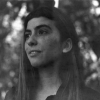
Camila Nebbia
saxophone, tenor
Kit Downes
keyboardsb.1986
Andrew Lisle
drums
Angelica Sanchez
piano
Marilyn Crispell
pianob.1947

Michael Formanek
bass, acousticb.1958

Lesley Mok
drumsLike many free saxophonists she reveals a fascination with timbre and texture, but unlike the majority does so without prolonged recourse to the dog whistle frequencies. Instead she alternates between gruff high octane bellows and a fragile abstraction, maximizing the emotive impact through careful manipulation of split tones or throttling her instrument by inserting a metal can into the bell or placing it against her thigh for muffled, strangulated cries.
Downes, who most may know from his ECM outings with his threesome Enemy or on organ with saxophonist Tom Challenger, was a revelation in this sometimes combustible setting. Right from the gitgo, his scampering runs and flashes to the extremes of the keyboard were fundamental to the band's ethos. But he also brought something different, with a flair for repurposing melodic fragments into the free setting, serving as source material for Nebbia if she wished.
The resultant back and forth between the two was stunning, with Downes also sometimes paraphrasing the saxophonist's lines to generate a fugue-like dimension to the proceedings. Lisle too was hugely responsive, whether racing in synch with Nebbia's reed jabbering, or delicately stroking his cymbals in passages of barely audible luminosity. The group has no recordings to its name, but should remedy that situation as soon as possible.
Marilyn Crispell
In the first of two performances at this year's festival (for her second she appeared with
Joe Lovano
drumsb.1952

Marilyn Crispell
pianob.1947

Alexander Hawkins
pianob.1981

Cecil Taylor
piano1929 - 2018
But the magic was that she was able to make all this into a coherent whole. Her second piece was a very personal interpretation of

McCoy Tyner
piano1938 - 2020
Sylvie Courvoisier's Poppy Seeds
Brooklyn-based Swiss born pianist
Sylvie Courvoisier
piano
Patricia Brennan
vibraphone
Thomas Morgan
bass, acoustic
Dan Weiss
drumsAs always with Courvoisier there were additional twists in the tail, with space for odd suspensions and miniature sideways forays as well as allusions to contemporary classical forms. But the quartet allowed full rein to Courvoisier's propulsive drive without sacrificing the complexity and risk-taking which makes her work so enthralling. The five pieces contrasted full-on thickets with sudden clearings where a single instrument might strut its stuff.
Whether in involved unisons, solos of sparkling notes grounded by a deeper clang, or subtle pitch-bending electronics, Brennan was always a match for the leader. Morgan and Weiss meshed completely both in jazzy pulse and discontinuous meter, while the bassist's mastery of melodic counterpoint offered listeners another way in. But notwithstanding her confreres, Courvoisier remained an engaging focal point, deploying rubbed piano sighs, poltergeist knocks, and flamboyant crashes alongside passages of astounding prowess and feeling.
Joachim K©╣hn French Trio
Another pianist, the eighty-year old German
Joachim Kuhn
pianob.1944

Don Cherry
trumpet1936 - 1995

Michael Brecker
saxophone, tenor1949 - 2007

Joe Henderson
saxophone1937 - 2001

Ornette Coleman
saxophone, alto1930 - 2015
For his first Festival performance since 2013, he debuted his new French Trio comprising bassist " data-original-title="" title="">Thibault Cellier and drummer

Sylvain Darrifourcq
drums
Emile Parisien
saxophone, sopranob.1982
Yet in spite of the apparent looseness, the arrangements were tight. When the pianist suddenly halted his torrential outpouring at one point during the first piece, bass and drums parked their busy pulse on a dime. K©╣hn's romantic, even florid, piano vied with stuttery drums and spacious bass, sometimes in a delicate give and take, but at other times in an ongoing stream in which he rarely repeated himself. An elusive conversational ballad "Go S©╣d" presaged the spirited boppy intricacy of Coleman's "Homogeneous Emotions," before the crowd demanded an encore.
Decoy with Joe McPhee
On the opening night another octogenarian, 86-year old saxophonist
Joe McPhee
woodwindsb.1939

John Edwards
bass, acoustic
Steve Noble
drumsb.1960
There had been some doubt over whether McPhee would be well enough to travel, given recent surgery, but happily he was able to hold his own. While his instrumental stamina was noticeably limited, instead he took the opportunity to exclaim some of his evocative poems, beginning the set with a theatrical declamation of "How Long Has Trane Been Gone?," while Edwards gently thrummed and rippled behind. As he finished he cued the band who pitched into a somersaulting forward motion, Hawkins melting the keys on the B3, Noble laying down an unrelenting beat and Edwards weaving a knotty pizzicato tapestry.
As the band pushed the needle into the red, McPhee issued a litany of tenor screams, before progressively calming proceedings with a series of long tones. That established the template for the set: a series of exuberant fever pitch peaks separated by elegaic vales, interspersed with heartfelt recitations. While perhaps some of the intensity associated with the hook-up might be missing, the audience nonetheless craved an encore.
Sun Mi Hong's BIDA Orchestra
Edwards returned as part of Amsterdam-based Korean-born drummer
Sun Mi Hong
drums
John Dikeman
saxophone, tenorb.1983

Mette Rasmussen
saxophone, altoAlistair Payne
trumpetJozef Dumoulin
keyboardsBut having assembled so much talent, there was no point in having them glued to charts, so she wisely granted spaces for group interaction as well as features for each. One of the downsides of an all star group is the difficulty in getting everyone together, so there was at times tentativeness in some of the transitions. However that vanished whenever the horns came to the fore, helped by Rasmussen coordinating some of the interventions. Her solo on the second piece was one of the standouts, building up a bullish roar on alto saxophone, she howled and screamed, hopping from foot to foot as if exorcising demons. Dikeman too erupted on an earlier number, accompanied by sudden attacks from the leader's drums. His falsetto wails, choked cries and

Albert Ayler
saxophone, tenor1936 - 1970
Elsewhere
One notable strand of the Festival programming brought three Swedish bands to the Main Stage. The honor of launching the entire event went to bassist
Vilhelm Bromander
bass, acousticb.1988
Marianne Svašek
vocals
Martin Kuchen
saxophone
Elin Forkelid
saxophone, tenorChrister Bothen
clarinet, bass
Mattias Ståhl
vibraphoneb.1971
Alto saxophonist
Anna Hogberg
saxophone, alto
Lisa Ullen
pianoNiklas Barno
trumpetThe single continuous piece built from a whispering start to juddering monolithic slabs, sounding like a collision between the Mingus Big Band and the Fire Orchestra (of which H?gberg is also a part), before going through a series of episodes which included mournful refrains, bowed saws, ghost train spookiness and a double drum freakout. Among brief turns in the spotlight, those for
 "
data-original-title="" title="">Per-?ke Holmlander's squelchy tuba, Ullen's angular piano in tandem with
"
data-original-title="" title="">Per-?ke Holmlander's squelchy tuba, Ullen's angular piano in tandem with Dieb13
electronicsAlthough only half the size, the third of the Swedish units trumpeter

Goran Kajfes
trumpetJosefin Runsteen
violinLeo Svensson Sander
celloThe Sun Ra Arkestra, with its mixture of foot tapping big band charts, space chants and processions through the auditorium was its usual joyous self. At the Quasimodo club, Rasmussen returned on alto saxophone in The Sleep Of Reason Produces Monsters, alongside the turntables of Miriam Rezaei, electronics and occasional trumpet of

Gabriele Mitelli
trumpetb.1988

Lukas König
drumsb.1988

John Hollenbeck
drumsb.1968

Anna Webber
saxophone, tenorb.1984

Sarah Rossy
vocalsChiquita Magic
keyboardsBy all accounts the shows by

Devin Gray
drumsb.1983
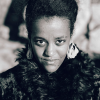
Sofia Jernberg
vocalsOtomo Yoshihide's Special Big Band
If the Festival started with a quiet invocation, it ended with a prolonged bang in the form of
Otomo Yoshihide
guitarEven with so many members, there were still opportunities for veteran guitar guru Yoshihide to impose his particular form of avant noise, scrubbing and scrabbling at the fretboard in during

Charlie Haden
bass, acoustic1937 - 2014

Eric Dolphy
woodwinds1928 - 1964
Outro
That every concert was sold out is an eloquent testimony to the work of the team led by Festival Director Nadine Deventer. It once again demonstrated that with the right presentation, avoiding the usual big names in favor of more adventurous art does not mean losing the audience. As former Director Richard Williams stated, the Berlin audience likes to be challenged. With its excellent sound, superb programming, top notch venues, and now community outreach, Jazzfest Berlin remains at the pinnacle of what a jazz festival should be in these troubled times.Tags
Festivals Talking
Darius Jones
John Sharpe
Germany
Berlin
Gerald Cleaver
James Meger
Peggy Lee
Kris Davis
Terri Lyne Carrington
Val Jeanty
Nick Dunston
Ronald Shannon Jackson
Wayne Shorter
Bud Powell
Camila Nebbia
Kit Downes
Andrew Lisle
Angelica Sanchez
Marilyn Crispell
Michael Formanek
Vinny Sperrazza
Lesley Mok
Tom Challenger
Alexander Hawkins
Cecil Taylor
McCoy Tyner
Sylvie Courvoisier
Patricia Brennan
Thomas Morgan
Dan Weiss
Joachim K©╣hn
Don Cherry
Michael Brecker
Joe Henderson
Ornette Coleman
Thibault Cellier
Sylvain Darrifourcq
Emile Parisien
Joe McPhee
John Edwards
Steve Noble
Sun Mi Hong
John Dikeman
Mette Rasmussen
Alistair Payne
Jozef Dumoulin
Albert Ayler
Vilhelm Bromander
Marianne Sva?ek
Martin Kuchen
Mats Alekint
Elin Forkelid
Christer Bothen
Mattias St?hl
Lisa Ullen
Niklas Barn?
Per ?ke Holmlander
dieb 13
Goran Kajfes
Josefin Runsteen
Leo Svensson Sander
Miriam Rezaei
Gabriele Mitelli
Lukas K?nig
John Hollenbeck
Anna Webber
Sarah Rossy
Chiquita Magic
Devin Gray
Sofia Jernberg
otomo yoshihide
Charlie Haden
Eric Dolphy
Comments
PREVIOUS / NEXT
Darius Jones Concerts
Sep
20
Sat

Efw Presents: Darius Jones Trio
VBI Theatre at Cunneen-Hackett Arts CenterPoughkeepsie, NY
Oct
17
Fri
Otherlands Trio
The Jazz GalleryNew York, NY
Nov
14
Fri

Otherlands Trio
Firehouse 12New Haven, CT
Support All About Jazz
 All About Jazz has been a pillar of jazz since 1995, championing it as an art form and, more importantly, supporting the musicians who make it. Our enduring commitment has made "AAJ" one of the most culturally important websites of its kind, read by hundreds of thousands of fans, musicians and industry figures every month.
All About Jazz has been a pillar of jazz since 1995, championing it as an art form and, more importantly, supporting the musicians who make it. Our enduring commitment has made "AAJ" one of the most culturally important websites of its kind, read by hundreds of thousands of fans, musicians and industry figures every month.
Go Ad Free!
To maintain our platform while developing new means to foster jazz discovery and connectivity, we need your help. You can become a sustaining member for as little as $20 and in return, we'll immediately hide those pesky ads plus provide access to future articles for a full year. This winning combination vastly improves your AAJ experience and allow us to vigorously build on the pioneering work we first started in 1995. So enjoy an ad-free AAJ experience and help us remain a positive beacon for jazz by making a donation today.

Berlin
Concert Guide | Venue Guide | Local Businesses
| More...








 Buy Now
Buy Now




